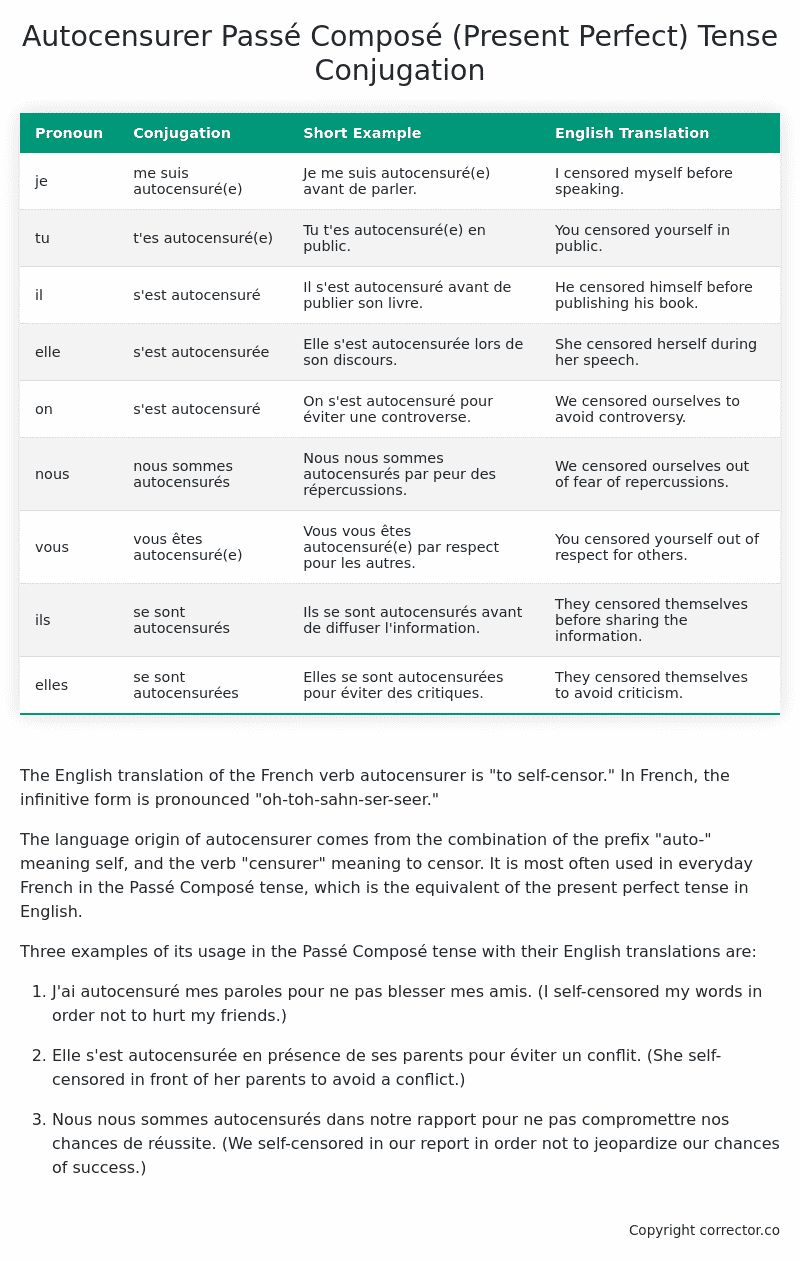Passé Composé (Present Perfect) Tense Conjugation of the French Verb autocensurer
Introduction to the verb autocensurer
The English translation of the French verb autocensurer is “to self-censor.” In French, the infinitive form is pronounced “oh-toh-sahn-ser-seer.”
The language origin of autocensurer comes from the combination of the prefix “auto-” meaning self, and the verb “censurer” meaning to censor. It is most often used in everyday French in the Passé Composé tense, which is the equivalent of the present perfect tense in English.
Three examples of its usage in the Passé Composé tense with their English translations are:
-
J’ai autocensuré mes paroles pour ne pas blesser mes amis. (I self-censored my words in order not to hurt my friends.)
-
Elle s’est autocensurée en présence de ses parents pour éviter un conflit. (She self-censored in front of her parents to avoid a conflict.)
-
Nous nous sommes autocensurés dans notre rapport pour ne pas compromettre nos chances de réussite. (We self-censored in our report in order not to jeopardize our chances of success.)
Table of the Passé Composé (Present Perfect) Tense Conjugation of autocensurer
| Pronoun | Conjugation | Short Example | English Translation |
|---|---|---|---|
| je | me suis autocensuré(e) | Je me suis autocensuré(e) avant de parler. | I censored myself before speaking. |
| tu | t’es autocensuré(e) | Tu t’es autocensuré(e) en public. | You censored yourself in public. |
| il | s’est autocensuré | Il s’est autocensuré avant de publier son livre. | He censored himself before publishing his book. |
| elle | s’est autocensurée | Elle s’est autocensurée lors de son discours. | She censored herself during her speech. |
| on | s’est autocensuré | On s’est autocensuré pour éviter une controverse. | We censored ourselves to avoid controversy. |
| nous | nous sommes autocensurés | Nous nous sommes autocensurés par peur des répercussions. | We censored ourselves out of fear of repercussions. |
| vous | vous êtes autocensuré(e) | Vous vous êtes autocensuré(e) par respect pour les autres. | You censored yourself out of respect for others. |
| ils | se sont autocensurés | Ils se sont autocensurés avant de diffuser l’information. | They censored themselves before sharing the information. |
| elles | se sont autocensurées | Elles se sont autocensurées pour éviter des critiques. | They censored themselves to avoid criticism. |
Other Conjugations for Autocensurer.
Le Present (Present Tense) Conjugation of the French Verb autocensurer
Imparfait (Imperfect) Tense Conjugation of the French Verb autocensurer
Passé Simple (Simple Past) Tense Conjugation of the French Verb autocensurer
Passé Composé (Present Perfect) Tense Conjugation of the French Verb autocensurer (this article)
Futur Simple (Simple Future) Tense Conjugation of the French Verb autocensurer
Futur Proche (Near Future) Tense Conjugation of the French Verb autocensurer
Plus-que-parfait (Pluperfect) Tense Conjugation of the French Verb autocensurer
Passé Antérieur (Past Anterior) Tense Conjugation of the French Verb autocensurer
Futur Antérieur (Future Anterior) Tense Conjugation of the French Verb autocensurer
Subjonctif Présent (Subjunctive Present) Tense Conjugation of the French Verb autocensurer
Subjonctif Passé (Subjunctive Past) Tense Conjugation of the French Verb autocensurer
Subjonctif Imparfait (Subjunctive Imperfect) Tense Conjugation of the French Verb autocensurer
Conditionnel Présent (Conditional Present) Tense Conjugation of the French Verb autocensurer
Conditionnel Passé (Conditional Past) Tense Conjugation of the French Verb autocensurer
L’impératif Présent (Imperative Present) Tense Conjugation of the French Verb autocensurer
L’infinitif Présent (Infinitive Present) Tense Conjugation of the French Verb autocensurer
Struggling with French verbs or the language in general? Why not use our free French Grammar Checker – no registration required!
Get a FREE Download Study Sheet of this Conjugation 🔥
Simply right click the image below, click “save image” and get your free reference for the autocensurer present perfect tense conjugation!

Autocensurer – About the French Passé Composé (Present Perfect) Tense
Formation of the Passé Composé
Set the auxiliary verb with either
Conjugate the auxiliary verb
Add the past participle
Common everyday usage patterns
Narrating Past Events
Sequential Actions
Describing Completed Actions
Interactions with other tenses
Imperfect Tense
Conditional and Future Tenses
Summary
I hope you enjoyed this article on the verb autocensurer. Still in a learning mood? Check out another TOTALLY random French verb conjugation!


